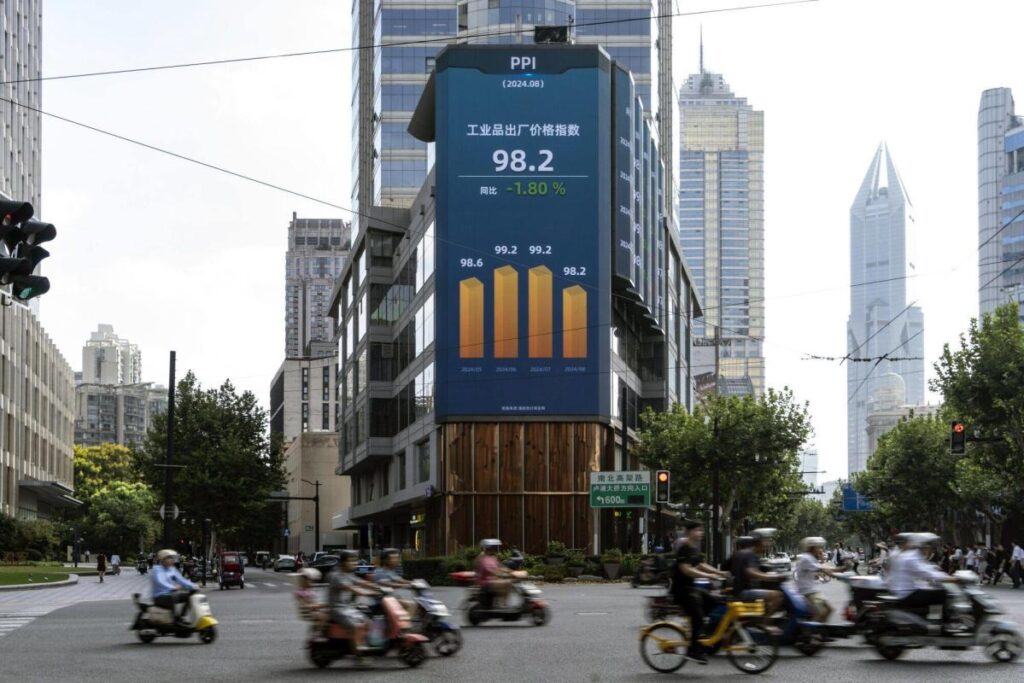The looming US presidential election is adding to a slew of headwinds for Chinese stocks, as both candidates use hardline rhetoric on economic policy towards Beijing.
US vice-president Kamala Harris and former president Donald Trump agreed on very little during their debate last week, but both favour a tough stance towards the world’s second-largest economy, using technology restrictions or tariff hikes. Regardless of the election outcome, geopolitical tensions will continue to haunt Chinese stocks for another four years, according to Daiwa Securities Group.
Fallout from the debate may exacerbate negative sentiment towards China’s US$8 trillion stock market, where the benchmark CSI 300 Index slumped to its lowest level in more than five years last week amid concerns about a dire growth outlook. The gauge has surrendered all of the gains that direct state buying of stocks and exchange-traded funds sparked earlier this year, underscoring the failure of a regulatory effort to hold the decline in check.
Do you have questions about the biggest topics and trends from around the world? Get the answers with SCMP Knowledge, our new platform of curated content with explainers, FAQs, analyses and infographics brought to you by our award-winning team.
China’s assets and economy may face further downside risks after the US election, and policy support needs to ramp up, according to China Merchants Securities.
“If Harris is elected, she will very likely retain the tariffs imposed by the Biden administration on key Chinese products [such as electric vehicles],” said Zhang Jingjing, an analyst at the brokerage. “If Trump wins, Chinese exports will be front-loaded in the near term before falling afterwards, given all-out tariffs are his fundamental policy. More active domestic policies will be needed to counter the fallout.”
In the debate, Harris criticised her rival for not doing enough to protect US interests against China, accusing Trump of selling American semiconductor chips that Beijing used to enhance its military power. A Harris victory would mean the continuation of the Biden administration’s targeted tech restrictions, which would pose more challenges for China’s tech supply chains, according to Daiwa.
Trump, on the other hand, threatens to impose a 60 per cent tariff on all Chinese imports. The former president placed more than US$300 billion of levies on Chinese goods during his first term, starting a trade war that chilled the relationship between the world’s two biggest economies to the frostiest level in decades.
Tensions between the two nations remain elevated. The House of Representatives last week approved a bill that would ban federal contracts with Chinese biotech companies. That sent shares of Wuxi AppTec and Wuxi Biologics plunging in Hong Kong, as the two rely on the US for at least half of their revenue. The legislation still needs to pass the US Senate before Joe Biden could sign it into law.
“Uncertainty over the US election and future US policies toward China are keeping investors on the sidelines,” US asset-management firm Cambridge Associates said in a research note last month. “With these considerations in mind, investors should hold Chinese equities in line with their portfolio benchmark weight.”
For a rally in Chinese stocks to sustain, investors would need to see a rebound in domestic confidence and demand, particularly for the battered property and consumer sectors, it said.
Chinese stocks have taken a beating since Biden took office in January 2021. The CSI 300 Index and the Hang Seng Index both tumbled 42 per cent in that span, making them the worst performers among the world’s major benchmarks, according to Bloomberg data. The S&P 500 Index has risen 45 per cent in the span.
A screen displays financial figures in Shanghai on September 12, 2024. Photo: Bloomberg alt=A screen displays financial figures in Shanghai on September 12, 2024. Photo: Bloomberg>
Shares in mainland companies fared better during Trump’s term from 2017 to 2021. The CSI 300 rose 65 per cent and the Hang Seng gauge gained 30 per cent, although both underperformed a 70 per cent advance in the S&P 500 in the period.
For now, the best strategy to ride out the uncertainty of the US election is to buy into the stocks that are able to deliver stable dividend payouts, according to UBS Group.
“Amid geopolitical uncertainties, we continue to favour a high-dividend yield strategy as a core portfolio, with beta options in the form of internet, property-related sectors, education and [semiconductor] equipment,” said James Wang, Hong Kong-based head of China strategy at the Swiss bank.
This article originally appeared in the South China Morning Post (SCMP), the most authoritative voice reporting on China and Asia for more than a century. For more SCMP stories, please explore the SCMP app or visit the SCMP’s Facebook and Twitter pages. Copyright © 2024 South China Morning Post Publishers Ltd. All rights reserved.
Copyright (c) 2024. South China Morning Post Publishers Ltd. All rights reserved.
Read the full article here

